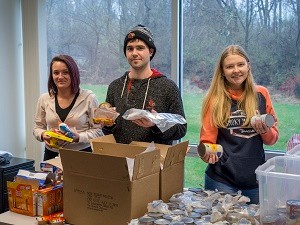
Clermont Bearcats Food Pantry Meets Critical Needs of Students
UC Clermont College students in need can now access critical food and hygiene items without leaving campus.
The Clermont Bearcats Food Pantry opened in April by offering students To-Go Bags that contain individual soups, canned fruit and meat, single-serve mac and cheese, granola bars and travel-size personal hygiene products. Bags have been placed with departments and offices throughout campus, including The Learning Center, Advising, the library and Veterans Affairs, and students can access the bags through any advisor or other trusted staff or faculty member.
The idea for the campus food pantry was first surfaced two years ago by Jennifer Radt, Senior Director of Student Affairs, said Sarah Robinson, the UC Clermont student worker who is helping launch the pantry.
We wanted to create a resource that was convenient for students while minimizing the stigma for students seeking help, said Robinson, who will graduate with her associate degree in social work this spring.
Similar resources are also available at UCs Uptown and Blue Ash Campuses. According to research by the Urban Institute, two-year college students have the higher levels of food insecurity compared to their peers at four-year institutions.
Community support for the Clermont Bearcats Food Pantry has been strong. The pantry has received one grant so far and has an ongoing partnership with Sams Club in Eastgate, with the store donating $100 a month of items requested by the college. Recently, more than $3,000 was raised for the pantry from college faculty and staff during UCs Day of Giving, and students donated money and canned goods during the colleges annual Spring Fling event on April 11th.
Though Robinson will transfer to UCs Uptown Campus to complete her bachelors degree in social work this fall, she plans to work with the food pantry there and hopes that the Clermont pantry continues to grow as an important resource in the college community. The next step for the pantry is to secure a permanent space on campus, which would not only help reach more students, but also give other students, faculty and staff more opportunities to volunteer.
Id like to see that students who need it are able to utilize the pantry, and that the students and others who volunteer are proud to help, Robinson said. I think the pantry has already proven that it has the potential to be a community-building experience.
Tags
Related Stories
UC's record graduating class prepares for next chapter
April 22, 2024
UC will confer degrees to 7,521 degrees to 7,391 students. (Some students are earning multiple degrees.) Both represent new records at UC for a single graduating class dating back two centuries.
UC Clermont to host Rapid Application Events
April 16, 2024
The University of Cincinnati Clermont College will hold four free Rapid Application Events on campus during May and June.
UC President Neville Pinto shares 2024 State of the University...
April 16, 2024
University of Cincinnati President Neville G. Pinto shared his 2024 Sate of the University address with the campus community on April 15.
